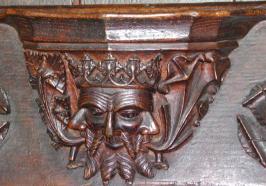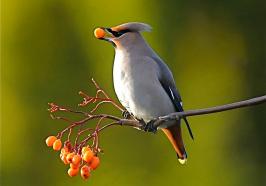Religion and faith
Cumbria is one of the least culturally diverse counties in England, with census returns revealing that Christianity is the most-followed religion, distantly followed by Buddhism and Islam. Borrowdale is representative of this picture, with three places of Christian worship in the valley.
However, there are plenty of opportunities to learn about different faiths and philosophies, with numerous historical sources and places to visit. It is important to make the most of these, broadening students’ concepts, knowledge, and discussion of religion, faith, philosophy, and community. Even within Borrowdale there are different forms of Christian worship and lifestyle, from Methodist Wesleyans to Anglicans.
Students can study the history of religion in Borrowdale, linking religion to other aspects of the valley’s social history. From the cultural heritage associated with St Herbert, the 7th century hermit on St Herbert’s Island on Derwent Water, to the role of the Grange Methodist Chapel in Borrowdale community life, education, and tourism, we can look at the ways religion, faith, and community affect our everyday lives.
Quakerism and Buddhism can be explored in exciting ways in Cumbria. For instance, there is an international college for Buddhist studies at Conishead Priory in Ulverston (South Cumbria), where school visits are welcomed and the guides (Buddhist teachers) are familiar with the Key Stages of the Religious Education ‘Agreed Syllabus’ for nearby Education Authorities.
The origins of Quakerism developed in Cumbria. Pardshaw Hall, near Cockermouth, was an early stronghold of Quakerism, and in 1650 George Fox preached on Pardshaw Crag to large crowds. In the Kendal Meeting House there is a beautiful community tapestry, illustrating 350 years of Quaker history on 77 panels. The project involved 4000 men, women, and children from 15 different countries, and the tapestry and its accompanying museum are open to the public. Today, there is Quaker thinking behind conservation movements and campaigns for nuclear disarmament.
Carlisle, the only city in Cumbria, has a beautiful cathedral which offers educational visits. The cathedral is the seat of the Anglican Bishop of Carlisle.
Inter-faith discussions will find particular inspiration at Rose Castle in Dalston, where groups from all over the world are brought together to explore different religions, faiths, and philosophies.
The three-week Keswick Convention in July is a huge event, with numerous opportunities to attend talks and workshops.
Through these activities and discussions students will be able to engage more deeply with different religions and topical issues, strengthening the inter-faith activities in Cumbria.
-
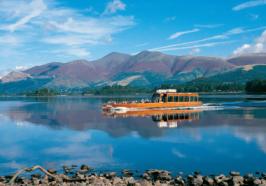 Group trips on the Keswick Launch
Group trips on the Keswick Launch -
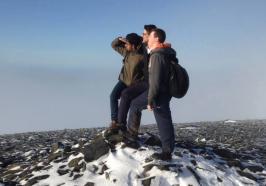 Birmingham University Wilderness Medicine Students
Birmingham University Wilderness Medicine Students -
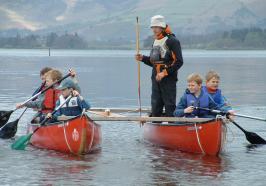 Working together on Derwent Water
Working together on Derwent Water -
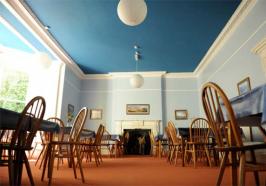 Dining room
Dining room -
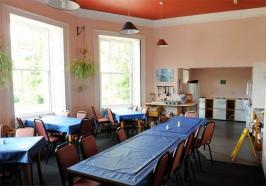 Self catering kitchen
Self catering kitchen -
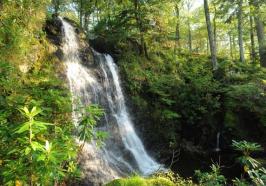 Barrow Cascade: the waterfall in our grounds
Barrow Cascade: the waterfall in our grounds -
-
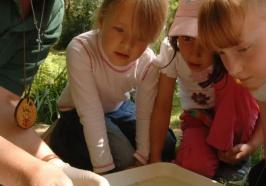 Classrooms in the forest
Classrooms in the forest -
 Pond-dipping
Pond-dipping -
Working together
-
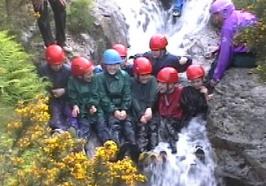 Gorge scrambling
Gorge scrambling -
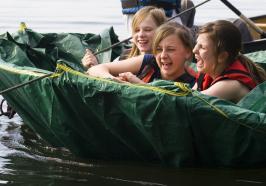 Raft building (and floating!)
Raft building (and floating!) -
.jpg) Be a Viking for a day!
Be a Viking for a day! -
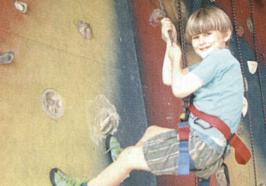 Indoor climbing
Indoor climbing -
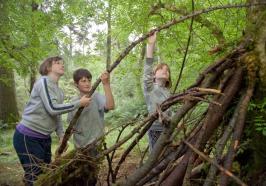 Shelter-building
Shelter-building


